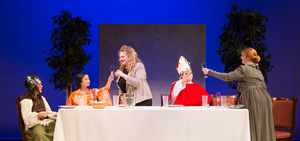Review: TOP GIRLS at Commonwealth Theatre Center

Caryl Churchill's 1982 play Top Girls has so much to say about women that it is staggering to realize that it is no less relevant thirty-seven years later. However it speaks to today, it does so from within an elliptical, non-linear narrative structure emblematic of the time of its creation.
Marlene (Taylor Broder) is an up-and-coming business executive in London who is first seen celebrating an important promotion by hosting a dinner for several women from history or at least art: the possibly apocryphal pontiff who was a woman, Pope Joan (Nicole Shariat); the explorer Isabella Bird (Shannon Bradley); Dull Gret, a figure from Flemish folklore featured in a famous painting by Pieter Bruegel the Elder (Leah Cohen); Lady Nijo, the Japanese mistress of an emperor and later a Buddhist nun (London Camba); and Patient Griselda from Geoffrey Chaucer's Canterbury Tales (Bella Detweiler).
This fantasia is almost the entire first act, and if Churchill left it there it would remain a singular theatrical experience, filled with feminist insight and outrageous humor. Ms. Shariat, in particular, has a great time playing the outsize Pope Joan, and if modern historians call her fictional, we can still wish that her incredible story of gender neutrality in a unique position of power was true.
After this, the play strikes a naturalistic tone as it charts the realities of women in Margaret Thatcher's England. As Marlene exults in the opportunity she expects with the first female Prime Minister, American audiences may find some of the irony and social context of the play elusive. She expresses these sentiments to her working-class sister, Joyce (Bradley again), who holds down two jobs as a single parent to Angie (Cohen), an emotionally vulnerable teenager, which will resonate with audiences in this country all too well.
By then it feels like we have entered an entirely different play, but any stylistic whiplash is overtaken by the time and space Churchill gives these characters. The deeply felt identification comes honestly.
Most of the cast does excellent work here, capturing the surface textures and sounds - kudos to dialect coach Jessica De La Rosa for the generally consistent working-class British accents, but Shannon Bradley goes much deeper, discovering the desperate, bitter truth of Joyce in the long, tough, final scene with Marlene. Taylor Broder is excellent as Marlene, the one actor who is not asked to play multiple roles and the through-line of the piece, and Churchill uses the relationship of the two sisters to illustrate the different kinds of sacrifice between which women must choose. One loses a family the other loses the opportunity for anything else.
Leah Cohen also does exemplary work as Angie, a tricky and emotionally complex character that walks the razor's edge. I also very much liked Beatrice Friesen's performance as Kit, Angie's best friend. Early in act two, they share a tender and insightful scene beautifully illuminating the near-sacred yet volatile nature of youthful friendship.
In her program notes, director Hallie Dizdarevic offers the more affirmative aspects of women's empowerment as the value of this production, but there is as much in Churchill's writing about the societal repression that is always grinding against the natural hopes and ambitions in women all around the world. Marlene's business is an employment agency, and in a few tightly scripted interview scenes the easy impediments of lazy expectations are tidily cataloged. They are so familiar as to be thought natural and inevitable conditions, but Top Girls challenges us to ask tough questions and throw off the yoke of complacency in a search for real change. It's a challenge that has been offered long before this play was written, and may haunt us for as many years more.
Top Girls
October 10, 11, 12, 17, 18, 19 @ 7:30 PM
October 12 & 19 @ 2:00 PM
Nancy Sexton Stage
Commonwealth Theatre Center
1123 Payne Street
Louisville, KY 40204
commonwealththeatre.org
Reader Reviews

Videos
